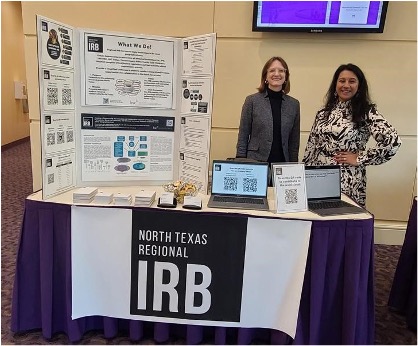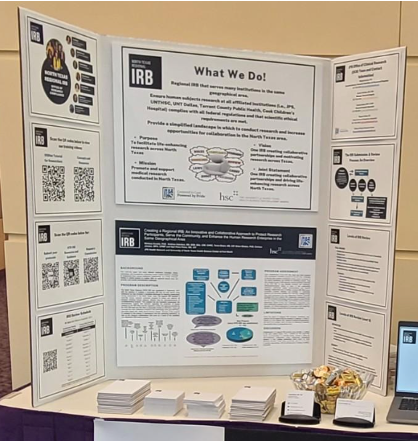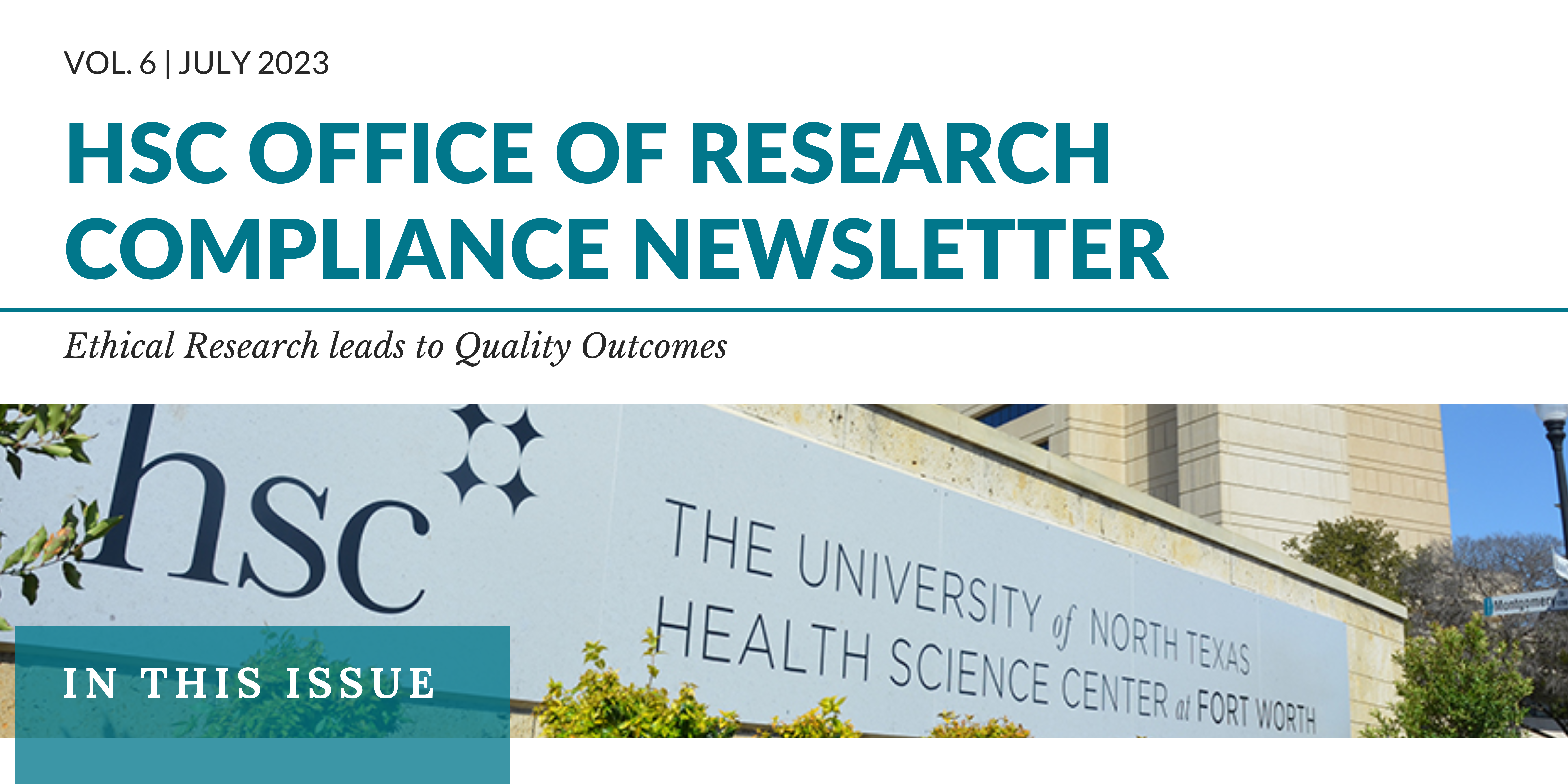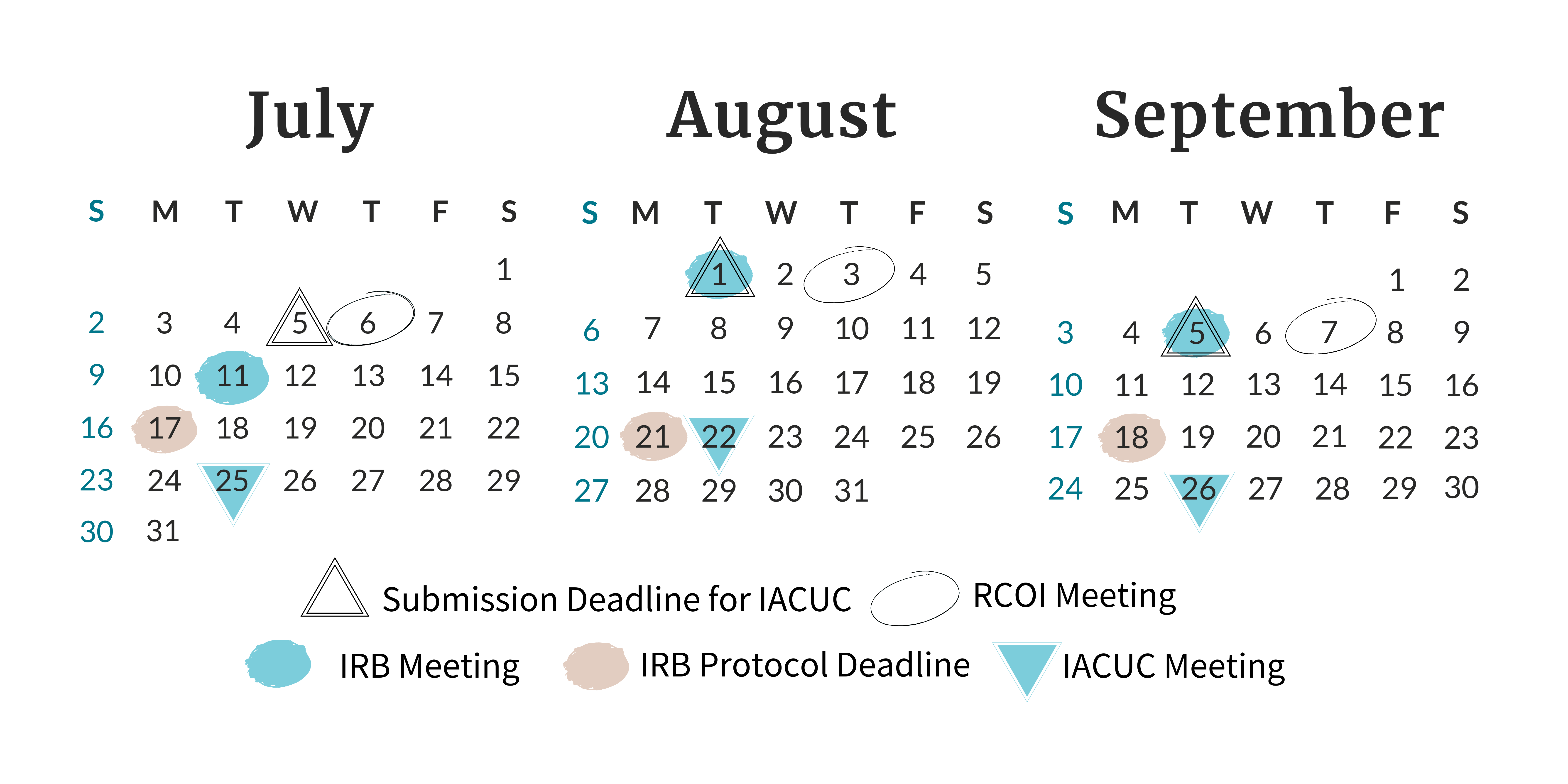|
Find the latest updates on all areas of the ORC, including the IACUC, the NTR IRB, RCOI, and International Compliance.
This quarter we introduce our ORC member – Christina Aguilar!
In this issue, we’ll help you get to the “Yes” with your Research Conflict of Interest training and disclosure form.
In this issue, we answer questions about how to make modifications to your research protocols for both IRB and IACUC approved projects.
In this special article, we detail the North Texas Regional IRB’s experience at JPS’ annual Research & Quality Symposium.
Find all of the meeting and deadline dates for the next three months of Board and Committee meetings.
|
|
What’s Happening in the ORC?
Here is the latest news from the ORC:
- We would like to congratulate Christina Aguilar who was promoted from her previous role as the Senior IACUC Administrator to her current role as Assistant Director, IACUC!
- In May, the NTR IRB had the privilege of participating in the JPS Annual Research and Quality Symposium. Please see our special article below for an in-depth look at our contribution to the symposium!
- The NTR IRB has created a form on their website for submitting Reliance Agreement requests titled “NTR IRB Reliance Agreement.” Investigators who are engaged in a collaborative study can use this form to request for another IRB to be the “IRB of record” for a multi-site human subject research study, or vice versa (request the NTR IRB to be the IRB of record for a multi-site human subject research study). Researchers requesting reliance should first complete this form, which will request an explanation of the situation/request, the reason for the reliance agreement, and any required documents.
- We are gearing up for our Annual RCOI Disclosure Campaign! Please be sure to check your emails for updates regarding this year’s campaign, which is set to start on September 1st, 2023.
back to top
Employee Spotlight – Meet Christina Aguilar
How long have you worked in the HSC Office of Research Compliance? What is your role, and what do you like best about it? I have worked in the Office of Research Compliance since March of 2016, so that is about 7 years. I am the Assistant Director for the IACUC. I’ve worked in this industry for close to 20 years, and being an advocate for animals is by far one of the best parts of the job. Plus, the team I get to work with in the Office of Research Compliance makes it worth coming to work every day.
Of the following values, which one do you believe you exemplify the most, and why?(Courageous Integrity, Be Curious, We Care, Better Together, and Show Your Fire!) Better Together! At UNTHSC, I really like the collaborative approach we take in ensuring the welfare of our animals. I love learning about each investigator’s research. I enjoy working with DLAM, they really take great care of the animals. We have the best Institutional Animal Care and Use Committee! I may be a little biased, but our IACUC Chair is wonderful to work with, and each committee member takes their role seriously. Individually, we all do our jobs well, but together we bring the excellence of an exemplary Animal Care and Use program. This was noted in our recent accreditation visit, when the site visitors commented on how well we worked together. We really are better together!
What is something we would be surprised to find out about you? I’m not sure if it’s too surprising, but when I’m not fighting for the welfare of animals, I enjoy creating music! Whether it’s pouring out my soul in my cello, banging out tunes on the piano, writing songs on my acoustic guitar, or jamming out on my bass guitar – I find some sort of way to express myself through music.
back to top
How to Get to the Yes
Research Conflict of Interest: What’s a Researcher to do?
Research Conflict of Interest, or “RCOI”, refers to situations in which financial, or other personal considerations may compromise, or have the appearance of compromising a researcher’s professional judgement in the conduct or reporting of research.
So, what does this actually mean?
Basically, conflicts of interest in research come in a variety of different shapes, sizes, and flavors. Consider the following situations (for the purposes of these examples, all situations take place in the U.S.):
|
|
|
- Dr. Bruce Banner, who is faculty at Stark University, has developed a new technology to help individuals recovering from knee replacement surgery. The patent for this technology is under the company, Strange Corporation, Inc., and Dr. Banner is the founder and CEO (note that Strange Corporation itself is not affiliated with Stark University). Dr. Banner will also be setting up a pilot human subject research project to test the safety and effectiveness of the technology, and he will be recruiting, consenting, and enrolling subjects from Stark University as well as the surrounding community. The ultimate goal will be to market this technology to the general population.
- Ms. Dany Targaryen serves as a Co-Investigator and Research Coordinator for several research projects at her place of employment, Winterfell State College. Separately, Ms. Targaryen also serves as an officer on the Board of a company called Dragon Solutions, Inc., which provides analytical services for research studies. Ms. Targaryen does not receive any compensation from Dragon Solutions for her time on the Board. Additionally, one of the research studies that Ms. Targaryen is listed on may, in the near future, be using Dragon Solutions to help conduct some of the analyses for their project.
- Dr. Bruce Wayne (a faculty and researcher at the University of Arkham) is named on a PHS -funded project and is a member of the American Psychological Association and Chair of the Steering Committee. His travel is reimbursed by the American Psychological Association to attend a committee meeting.
- Neurologist, Dr. Wanda Maximoff, recently started as a physician-researcher at Wakanda General Hospital (WGH). WGH is involved in an industry-sponsored Phase III clinical trial (as a recruiting site) which is studying the effects of a new drug to help individuals with insomnia. Dr. Maximoff is not the site PI, however, she is a co-investigator on the study. Prior to coming to WGH, Dr. Maximoff worked at the company, within the team, that developed the insomnia drug being currently studied as part of this clinical trial.
Each of the above examples present a potential (or actual) research conflict of interest that will need to be reviewed by the RCOI office.
While there are federal regulations that provide guidelines for ensuring objectivity in research (see 42 CFR Part 50, Subpart F) and ensuring institutions appropriately manage conflicts of interest (see 45 CFR Part 94.4), it is up to the researchers and their institutions to ensure any potential RCOIs (whether they be financial or not) are appropriately reviewed and managed (as needed). To help with that, HSC researchers are always able to review the HSC policy 8.105 on Research Conflict of Interest as well as the HSC RCOI Standard Operating Procedures.
Here is how the HSC RCOI disclosure process works:
- At HSC, researchers are required to submit an annual RCOI disclosure form. The RCOI campaign typically runs from September 1 – October 1 each year.
- RCOI training also needs to be completed annually, at the time the researcher completes their disclosure form (current RCOI training is done in the CITI Program system).
- Through the rest of the year, researchers should disclose any new significant financial interests (SFIs, e.g., new grant/award received or relationship in which the researcher will be paid for time services, etc.), travel disclosures for reimbursed or sponsored travel (related to institutional responsibilities), or any other situations in which the investigator will be devoting time or energy to an external entity/project which may bias (or potentially bias) the researcher’s work at HSC.
- The new/updated disclosures should be provided within 30 days of discovering or acquiring a new SFI or other potential conflict of interest, or sponsored travel (note this only applies to investigators with PHS funding).
- Upon receipt of a new or updated disclosure from a researcher, the RCOI Office will take an initial look at the disclosure and ensure all appropriate information has been received (the RCOI Office may follow-up with a researcher as needed, to ensure all necessary information is received).
- Once the pre-review of the disclosure has been completed, the RCOI Committee will either determine that:
- No further action is needed on the disclosure, or;
- That an RCOI Management Plan will need to be implemented. In this case, the RCOI Office and Committee will work with the researcher to create and implement the Management Plan. This Management Plan will be reviewed on at least an annual basis.
If you need additional information regarding the RCOI process at HSC, please visit the HSC Office of Research Compliance RCOI webpage, or contact us at Research.Compliance@unthsc.edu or 817-735-0409. We are always happy to answer any questions as needed!
back to top
|
|
|
You’ve Got Questions, We’ve Got Answers!
Q: I need to submit a modification to my study. What do I need to do?
For Human Subject Research Studies: All requests for modifications to IRB-approved human subject research studies must be submitted to the North Texas Regional IRB within the IRBNet system. Examples of protocol modifications include key personnel changes, revisions to the study procedures, adding new study documents, adding a recruitment source, etc.
How is a request for a protocol modification submitted for review? To submit a request for a protocol modification:
- First, access the project you want to modify in IRBNet.
- Create a new package for the submission. To create a new package, click on the link in the left-hand toolbar that reads, “Create a New Package.” You will select “Amendment/Modification” for package type.
- Upload all relevant documents (see the details of which materials need to be submitted below).
- Once all of the documents have been uploaded, submit the package in IRBNet. To do this, click on the “Submit Package” button.
What documents need to be submitted when requesting a protocol modification?
Key Personnel Changes Only: If only key personnel changes are being requested (e.g., addition and/or removal of key personnel), then the following documents need to be submitted for review:
- A completed “Application for Change in Study Personnel” form that has been signed by the principal investigator (PI), OR a signed memo from the PI that lists the requested changes.
- Both tracked and clean versions of the updated protocol synopsis displaying the revised list of key personnel; Note: Studies that require continuing reviews may wait until the time of continuing review to update the protocol synopsis.
- If any new key personnel are being added to the study, the following documents must also be submitted:
- Evidence that each new key personnel has completed adequate training in human subject research (e.g., CITI);
- A signed conflict of interest (COI) form for each new key personnel. Note: COI forms are required for Expedited and Full Board studies only (COI forms are not required for Exempt studies).
Protocol Modifications: When requesting other types of protocol modifications, the documents (listed below) need to be submitted for review:
- A signed memo from the PI that describes the proposed modifications and a brief justification for each of the changes.
- A “tracked changes” (redline) copy of the revised research document(s) (e.g., protocol synopsis, consent form, etc.) reflecting the proposed modifications. Note: Researchers should use the most-recent, IRB-approved versions of the research documents when making changes.
- A “clean” copy (where all tracked changes have been accepted) of the revised research document(s) reflecting the proposed modifications.
- Other research-related document(s), if any, that are associated with the proposed modifications (e.g., new research documents that are being added to the study, etc.).
Reminder: A protocol modification cannot be implemented until after the North Texas Regional IRB has approved the modification (and the PI/study team has received notification of the approval). Implementing the changes before IRB approval will result in a protocol violation or finding of non-compliance.
For Animal Research Studies: If you need to make changes to your approved IACUC protocol, you will do so by creating an Amendment in GRAMS. Examples of amendments include changes in funding, changes in personnel, revisions or additional procedures or study timepoints, changes in animal model, or increase in animal numbers.
How to submit an amendment for review: To submit an amendment to an IACUC protocol:
- Log into GRAMS, click the IACUC tab, and navigate to your Research Team space.
- Select the protocol you would like to amend.
- Click the Create Amendment button under the Next Steps section of the left toolbar; this will take you into the amendment form.
- In the “Amendment Short Title”, be sure this section includes your IACUC Protocol Number.
- For “Describe the Changes”, provide the details of the amendment. If increasing animal numbers, be sure to list the number of animals being added. If changing personnel, be sure to list the personnel names.
- In the “Describe the Rationale for Changes” section, please provide a justification for the need to amend the protocol.
- When “Continue” is clicked, it takes you into the original protocol. Be sure to only edit the sections that will be affected by the changes made.
- Once all the changes have been made, hit “Save” and then “Exit” (this will take you out of the form). Please note that this does not automatically submit the amendment for review.
- After exiting the protocol form, navigate to the left menu, where you will find the submit button.
Amendment Review: Once the amendment is submitted, the IACUC Office performs a pre-review of the amendment. If edits are needed, this will then be communicated back to you through the GRAMS system. There are four types of Reviews for amendments, determined by the types of changes made to the protocol:
- Full Committee Review (FCR): Generally, these are amendments that are adding significant changes, for example changing the objectives of the study, adding procedures that involve unrelieved pain/ distress, or adding a USDA covered species.
- Designated Member Review (DMR): These amendments are sent electronically to the Committee, who are given 5 business days to call for Full Committee Review. If no one calls for Full Committee Review, the amendment is then assigned to designated reviewer(s) (i.e., IACUC Members) to review, approve, require modifications, or call for Full Committee Review. Examples of these types of amendments include increasing animal numbers >10%, adding hazardous substances, or adding a survival surgery.
- Veterinary Verification and Consultation (VVC): These amendments are reviewed by the veterinarian. Examples of amendments that qualify for VVC are increasing animal numbers <10%, changes in anesthesia, addition of euthanasia method within the AVMA Guidelines for euthanasia, changes in approved blood/fluid/tissue collections, addition of non-survival surgery.
- Administrative Review (AR): These are amendments that are reviewed by the IACUC Office. Examples of these types of amendments are changes in funding, changes in personnel, or administrative edits/clarifications in the protocol.
Reminders and Tips & Tricks for IACUC amendments:
- Please note that as the amendment opens the protocol document in GRAMS for editing, you may only have one amendment open at a time; as such, you will not be able to submit a second amendment until the open amendment’s review process is complete.
- If adding personnel, be sure that all personnel being added have completed all training and personnel requirements before submitting the amendment. This will help prevent delays in the review and approval process.
- If adding public funding (e.g., NIH), be sure to attach the vertebrate animal section and the Research Strategy Section.
- If adding a substance and/or a procedure, be sure to create a procedure and attach it to the experiment section.
- If adding animal numbers, be sure to make the edits in the experiments section. The Animal Justification table should then be automatically updated.
- If adding a laboratory that has not yet been approved for animal use, be sure to set up a time for the IACUC to inspect the laboratory for approval.
- If adding hazardous substances, be sure to obtain any necessary safety approvals, attach the hazardous agent attachment to the protocol, and conduct consults with Safety and DLAM.
- Remember not to initiate any of the changes until IACUC approval has been granted (and the PI/study team has received notification of the approval). Initiating changes in your study without IACUC approval of the modifications can result in protocol non-compliance.
We are here to help you succeed! We hope this section will help you throughout your submission process.
Have a question you would like answered? Just click the link below to submit your question.
back to top
|
|
|
The North Texas Regional IRB at the May 2023 JPS Symposium!
As some may already know, the John Peter Smith (JPS) Health Network’s Office of Clinical Research, Quality Division, and Department of Academic Affairs hosted their annual Research & Quality Symposium on May 18th (in-person) and May 19th (virtually). The in-person event was held at the Texas Christian University (TCU) Horned Frog Grand Ballroom, located in Brown-Lupton University Union, and included the opportunity to network, view posters from selected research projects, and to watch all the Academic Excellence, Research, and Quality Awards be presented to some of the many talented individuals at JPS. A memorable Keynote Address was given by Dr. Brett Giroir, a physician-scientist (and former Assistant Secretary for Health in HHS, Acting FDA Commissioner, and Admiral in the US Public Health Service Commissioned Corps) who described his experience at the front lines of the COVID-19 response as a member of the White House Coronavirus Task Force and the national lead for testing and diagnostics (“Testing Czar”).
The North Texas Regional (NTR) IRB was invited to, and had the pleasure of, hosting a booth at the Symposium. This allowed for an invaluable experience to meet with many of our JPS researchers and partners face-to-face, and also connect potential research collaborators from JPS, HSC, as well as TCU! Our booth included general information on what the NTR IRB is (i.e., a regional IRB that serves many different organizations in North Texas area, allowing a simplified landscape for researchers to collaborate on research projects!), and also included a plethora of guidance and resources to put researchers on the right path to submitting their human subject research protocols!
There is no doubt the event was a hit – countless people from a wide variety of areas stopped by throughout the networking portion of the evening. JPS physicians, residents/interns, researchers, staff nurses and staff, TCU leadership, researchers, staff and students, and colleagues and researchers from HSC were just some of the few who stopped by to ask questions, discuss their potential or current research projects, or just visit with fellow colleagues (there were even a few guest appearances by some of our beloved NTR IRB members!). We could not have been happier to have had the opportunity to be involved in this event! Our goal at the NTR IRB is to “protect research participants, serve the community, and enhance the human research enterprise of its collaborating partners”; however, we rarely get to see the results of the research we approve and the advancements being made by our brilliant research community – and this event allowed us the opportunity to do just that!
Take a look below at some of the snapshots captured from the in-person event! Additionally, for more details about the 2023 JPS Research & Quality Symposium, please visit the website at https://www.jpshealthnet.org/research-quality-symposium.
 

back to top
|







Social media